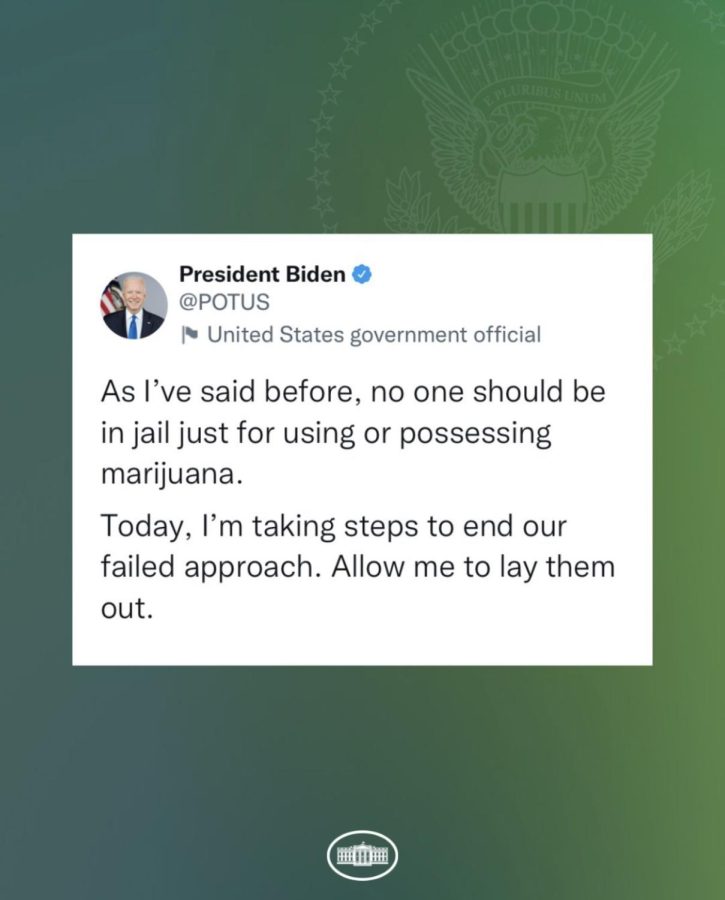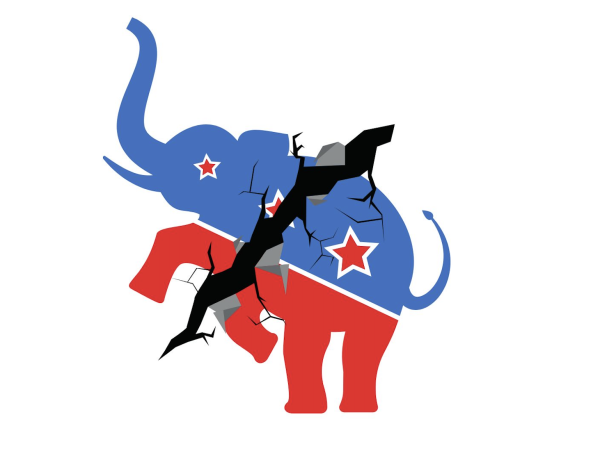Biden to pardon all federal charges of simple possession of cannabis
October 8, 2022
The Biden Administration announced that they would be pardoning all federal charges of simple cannabis possession on Oct. 6. Now fulfilling one of President Biden’s campaign promises, this move will pardon 6,500 people who were federally convicted on this charge, beginning in the 1970s, though records only date back to 1992.
The Administration also announced they would be tasking the Department of Health and Human Services and Merrick Garland, U.S. Attorney General, with assessing whether cannabis should be a Schedule I controlled substance, the same category it shares with illicit substances such as heroin and cocaine, and a category higher than fentanyl.
Simple cannabis possession is when someone possesses a small amount of cannabis but doesn’t have any intent to sell or distribute it. The possession must also not be linked to any convicted crimes. People who have been convicted of larger amounts of cannabis or had the intent to sell or sold cannabis will not be pardoned.
“There are thousands of people who were previously convicted of simple possession who may be denied employment, housing or educational opportunities as a result,” Biden stated in a post on his Twitter.
He continued, “Sending people to jail for possessing marijuana has upended too many lives… That’s before you address the clear racial disparities around prosecution and conviction.”
As I’ve said before, no one should be in jail just for using or possessing marijuana.
Today, I’m taking steps to end our failed approach. Allow me to lay them out.
— President Biden (@POTUS) October 6, 2022
According to the American Civil Liberties Union (ACLU), Black people are 3.4 times more likely than white people to be charged with possessing or selling cannabis, though both groups use cannabis comparably. In a video posted by The White House Twitter, Biden further explained that “while white and Black and brown people use marijuana at similar rates, Black and brown people are arrested, prosecuted and convicted at disproportionately higher rates.”
This decision is a step in the right direction toward decriminalizing cannabis use, but it dismisses the majority of people convicted of drug charges in the United States. In 2017, there were only 92 federal cannabis possession convictions out of 20,000 total drug convictions that year. Though there are no people currently incarcerated solely on cannabis charges, this move will help those convicted to be able to apply for jobs, housing, federal benefits and education, and is a precedent for cannabis reform at a time when people’s minds seem to be shifting toward legalization.
Biden also encouraged state leaders to follow in his footsteps and pardon people convicted on the state level of simple cannabis possession, which accounts for a much higher number than federal charges.
Many were surprised by this decision by President Biden, as he has been relatively quiet on this issue since he took office in 2020. People were further surprised because of his extensive history of contributing to mass incarceration in the U.S. during his Senatorial run. Throughout the ’70s and ’80s, he fought for legislation to deal with the increasing violent crime in America, such as mandatory minimum sentences for offenses like cannabis possession. Most consequentially, Biden signed the Violent Crime Control and Law Enforcement Act of 1994 under the advisement of President Bill Clinton, which significantly and disproportionately increased mass incarceration in Black communities across the country.
“The truth is, every major crime bill since 1976 that’s come out of this Congress, every minor crime bill, has had the name of the Democratic senator from the State of Delaware: Joe Biden,” Clinton stated in a speech in 1993.
Advocates for the legalization of cannabis were pleased with the decision, though some wished the administration had been even more liberal with their plan. Former Illinois Sen. and current president and CEO of the Marijuana Policy Project, Toi Hutchinson, praised the decision but criticized it for not being liberating enough. “This pardon… is just a drop in the bucket and can’t get in the way of banking reform and full legalization,” she said.
Adam Eidinger, a cannabis rights activist who is most known for leading Initiative 71, which legalized the recreational use of cannabis in Washington D.C. in 2015, was pleased with the decision but criticized it as well. “There’s all these crimes above simple possession. Almost no one gets charged with it. They usually get charged with more serious crimes like intent to distribute,” he said. He had hoped people who manufacture and distribute cannabis would also be pardoned.
Eidinger continued, “We should reward the President and the Democrats if they end the drug war and they bring the cannabis prisoners home, but they aren’t doing that with this. This is going to affect a very small group of people.”
The reactions from Republican leaders to this announcement were surprisingly mixed. Arkansas Sen. Tom Cotton called this “a desperate attempt to distract from failed leadership,” while David Yost, the Ohio Attorney General, said it was “the most political, cynical abuse of the pardon power in history.”
California Rep. Tom McClintock criticized Biden’s use of the legislative system, stating that though he supports the decriminalization of simple possession, he does not agree with Biden’s decision to “choose which laws to enforce and which to ignore.”
Other Republicans were pleased with the decision. South Carolina Rep. Nancy Mace said that she “applaud[s] the Administration for their necessary big step forward in bringing justice to so many.”
“I don’t always agree with the Biden administration, I’ve been very vocal about that. But this is a step in the right direction… I applaud the President,” she continued in an interview with Fox.
Cannabis is currently legal in 19 states, the District of Columbia and is legal for medicinal purposes in 37 states, four US territories and D.C.
This announcement comes just 34 days before the midterm elections, which are going to determine which party controls Congress. Pardoning simple cannabis possession at the federal level may help Democrats currently running for Senate gain the support of the younger generation, liberals and people of color, as this issue sits central to their campaigns.
Decriminalizing cannabis use is becoming higher on the agenda of leaders from both political parties, however this is the most significant move by any U.S. President to date.












